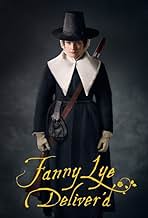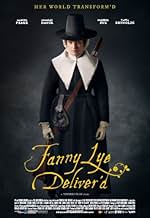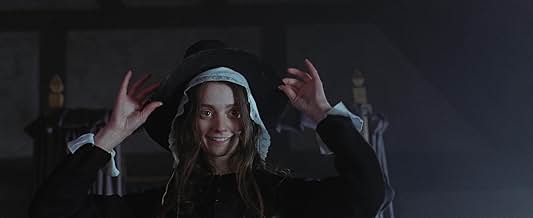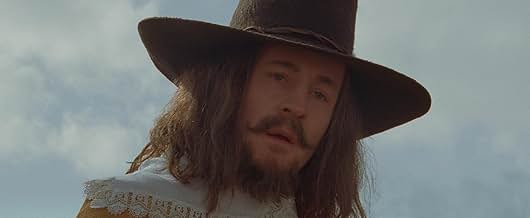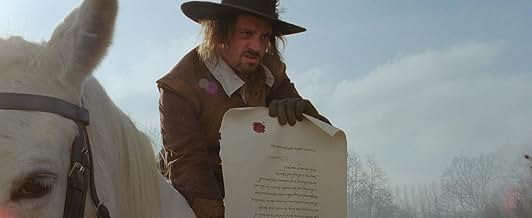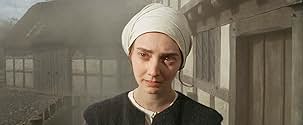Fanny Lye Deliver'd
- 2019
- 1h 52min
VALUTAZIONE IMDb
6,2/10
1986
LA TUA VALUTAZIONE
Una storia sviluppata in una fattoria isolata nello Shropshire nel 1657, dove una donna che impara a trascendere il suo matrimonio opprimente, riesce a scoprire un nuovo mondo di possibilità... Leggi tuttoUna storia sviluppata in una fattoria isolata nello Shropshire nel 1657, dove una donna che impara a trascendere il suo matrimonio opprimente, riesce a scoprire un nuovo mondo di possibilità.Una storia sviluppata in una fattoria isolata nello Shropshire nel 1657, dove una donna che impara a trascendere il suo matrimonio opprimente, riesce a scoprire un nuovo mondo di possibilità.
- Regia
- Sceneggiatura
- Star
- Premi
- 1 vittoria e 7 candidature totali
Recensioni in evidenza
Horrible Histories meets Hammer Horror meets Blackadder....
The basic story could have been quite good but the film is so unrealistic as to be more of a pantomime than a drama. Low budget has not allowed for getting anything dirty so all the clothes, house etc are like brand new, nothing grubby as it would obviously have been and everyone looks like they are fresh out of the shower.
The acting is surprisingly ham and the baddies are more like a comedy duo despite being evil.
All in all, a missed opportunity as could have been good with the right budget and the chance to create a realistic dark representation.
The acting is surprisingly ham and the baddies are more like a comedy duo despite being evil.
All in all, a missed opportunity as could have been good with the right budget and the chance to create a realistic dark representation.
I attempt to watch all the historical films no matter how bad they are due to my love for history. I saw some articles about the films journey and struggles to get it filmed edited and released. I was hoping that the journey of making Fanny Lye was as good as the end product. It was! Though the story felt rushed at one small section, and the sheriff contrasts heavily with other characters, the film provides high historical accuracy in an area cinema has rarely covered. It was a blast to watch and the almost 2 hour runtime somehow felt way shorter. Fox provided such a vibrant cunning show and his chemistry on-screen with Charles Dance was something amazing!!!!
I can see where some reviews are coming from with negativity as the film is no where near the sort of expectations a historical film tells, no super ordinary humans, just a regular 1600s family. But this film deserves a chance to be watched and a chance for an open mind to experience an era that you will probably never watch or hear of for many years in the future.
The light that falls on John Lye's farm is diffuse, a gentle glow that passes through mist, It enters widows, softly illuminating Fanny Lye as she attends to household tasks. The imagery presented by director Thomas Clay and cinematographer Giorgos Arvanitis recalls paintings of Millet and Vermeer. While Millet's laborers sow the fields in ways suggesting contentment, and Vermeer's women appear touched by grace, the toils of Fanny (Maxine Peake) are attended by neither sentimentality nor joy.
Any sense of contentment is dispelled by an expository voice over and revelatory closeups. Fanny kneels on a hardwood floor as John lashes a switch across her back, her hands rigorously twist cloth in a wash basin. And the lovely woods and hills that surround her do not indicate an insular existence as much as an isolated one. There are no sign lines of the world beyond the stands of the trees and crests.
When youthful strangers, Thomas (Freddie Fox) and Rebecca (Tanya Reynolds) arrive, they assimilate into the family, bringing touches of levity to the Lye's young son Arthur and glimpses of liberation to Fanny. Both are interrupted by corporal punishment whenever John's notions of decorum are disturbed.
Rebecca lightens some of Fanny's burdens and Thomas emits whips of sensuality, these supported by the slow glide of Arvanitis's camera through the kitchen window to the exterior. As the fields of vision expand so, too, does the prospect of Fanny's freedom. Arvanitis also enables the audience to watch the characters like a stealthy observer, employing takes that gently pass around trees and structures to unimpeded views of the men felling trees and the women completing chores. The graceful movement of the still cam incrementally exposes challenges to John's constrictive Puritan values.
Ideologies eventually clash.
The competing perspectives, each supported by scriptural passages, struggle for dominance, the power shifting like the fortunes of the forces still fighting to control post civil war England. The battle illustrates a harsh truth: once any dogma takes control, ugly aspects of self righteousness and revenge are manifested.
In witnessing the struggle, Fanny is mostly silent as Peake's expressive face registers inner conflict, tightening at the possibility of pain for John or Arthur and relaxing at the prospect of freedom. As John, Charles Dance subtlety indicates his emotions in ways indicative of his mastery of screen acting-a slight tuck of the chin conveys disapproval, a quick blink, fear. Fox is best when his Thomas cajoles and charms, less so when he is charged with emotion. Reynolds adeptly projects both rustic ingenuousness and joyful licentiousness.
Beauty is present throughout the film. The first image of Rebecca is a closeup of her eyes, large and soft as those in a da Vinci portrait. And the pastoral beauty of the surroundings is consistently present. When violence intrudes, it plays out both suddenly and through gruesome struggle, unnerving audiences largely inured to depictions of injury and death. If Fanny's liberation is to come, barriers can be breached only by destruction and agony.
Any sense of contentment is dispelled by an expository voice over and revelatory closeups. Fanny kneels on a hardwood floor as John lashes a switch across her back, her hands rigorously twist cloth in a wash basin. And the lovely woods and hills that surround her do not indicate an insular existence as much as an isolated one. There are no sign lines of the world beyond the stands of the trees and crests.
When youthful strangers, Thomas (Freddie Fox) and Rebecca (Tanya Reynolds) arrive, they assimilate into the family, bringing touches of levity to the Lye's young son Arthur and glimpses of liberation to Fanny. Both are interrupted by corporal punishment whenever John's notions of decorum are disturbed.
Rebecca lightens some of Fanny's burdens and Thomas emits whips of sensuality, these supported by the slow glide of Arvanitis's camera through the kitchen window to the exterior. As the fields of vision expand so, too, does the prospect of Fanny's freedom. Arvanitis also enables the audience to watch the characters like a stealthy observer, employing takes that gently pass around trees and structures to unimpeded views of the men felling trees and the women completing chores. The graceful movement of the still cam incrementally exposes challenges to John's constrictive Puritan values.
Ideologies eventually clash.
The competing perspectives, each supported by scriptural passages, struggle for dominance, the power shifting like the fortunes of the forces still fighting to control post civil war England. The battle illustrates a harsh truth: once any dogma takes control, ugly aspects of self righteousness and revenge are manifested.
In witnessing the struggle, Fanny is mostly silent as Peake's expressive face registers inner conflict, tightening at the possibility of pain for John or Arthur and relaxing at the prospect of freedom. As John, Charles Dance subtlety indicates his emotions in ways indicative of his mastery of screen acting-a slight tuck of the chin conveys disapproval, a quick blink, fear. Fox is best when his Thomas cajoles and charms, less so when he is charged with emotion. Reynolds adeptly projects both rustic ingenuousness and joyful licentiousness.
Beauty is present throughout the film. The first image of Rebecca is a closeup of her eyes, large and soft as those in a da Vinci portrait. And the pastoral beauty of the surroundings is consistently present. When violence intrudes, it plays out both suddenly and through gruesome struggle, unnerving audiences largely inured to depictions of injury and death. If Fanny's liberation is to come, barriers can be breached only by destruction and agony.
I was ready to turn this movie off. It's a period piece. Cromwell's in charge, the King was executed and a brutal war recently ended. I was bored. I would have rated it a 5, but the solid acting brought it up to 6.
About two thirds of the way through, there is a plot twist or two which were quite unexpected and gave the movie a bonus star. Try to stay until the credits run, as there is an epilogue which makes me now question if the movie was based on a real person.
About two thirds of the way through, there is a plot twist or two which were quite unexpected and gave the movie a bonus star. Try to stay until the credits run, as there is an epilogue which makes me now question if the movie was based on a real person.
If you live in a family that is quite strict, strangers coming from outside may feel like a welcome (pun intended) distraction. On the other hand, the father (wonderfully played here) may have the best interest in mind and heart, but his harsh and way too restricted views are not helping his wife or "kid".
The outlaws from outside really bring imbalance. Depending on your moral views, your sympathy may sway from one scene to the other. It is ok to feel, you are being given a tough choice. Morally speaking this isn't too easy - but that is what the movie gives you. Something to think about - something to chew on. And questions about what is good and what is bad, that go beyond religion and obvious answers.
Not sure why my previous comment got deleted, but while I had not saved it yet, I will park this somewhere just in case, someone feels the need to be mean - which would bring us to the characters: who is eventually the mean one? Who do you side with? Have you decided yet?
The outlaws from outside really bring imbalance. Depending on your moral views, your sympathy may sway from one scene to the other. It is ok to feel, you are being given a tough choice. Morally speaking this isn't too easy - but that is what the movie gives you. Something to think about - something to chew on. And questions about what is good and what is bad, that go beyond religion and obvious answers.
Not sure why my previous comment got deleted, but while I had not saved it yet, I will park this somewhere just in case, someone feels the need to be mean - which would bring us to the characters: who is eventually the mean one? Who do you side with? Have you decided yet?
Lo sapevi?
- QuizThe local accent in Shropshire and eastern Powys of the time was not recognisably "Welsh" or "West Midlands" in the way that might be expected today.
- BlooperAmong the linguistic anachronisms in the script are the following: Pee - to urinate: Although an old expression, the Oxford English Dictionary states that the term didn't come about until the eighteenth century, the century after this film is set. Shrooms - mushrooms with psychedelic properties: The first recorded use of this term in print was in Australia in 1977 Mixed emotions - a mid-twentieth century term describing ambivalence. Bleed out - to die due to blood loss: A twentieth century term with its origins in the United States (it is suggested that it was originally military jargon). Lose the attitude - An instruction meaning don't be rude: A late twentieth century term with its origins in the US.
- Versioni alternativeAlso exists in an Extended Cut, around 19 minutes longer than the Theatrical Cut, and currently only available through the film's 4K Ultra HD disc release in the UK. This version is the director's preferred version of the film.
- Colonne sonoreMarch to Joy
Written by Thomas Clay
Based on "Symphony No. 9" written by Ludwig van Beethoven
Heard as end theme
I più visti
Accedi per valutare e creare un elenco di titoli salvati per ottenere consigli personalizzati
- How long is The Delivered?Powered by Alexa
Dettagli
- Data di uscita
- Paesi di origine
- Siti ufficiali
- Lingua
- Celebre anche come
- The Delivered
- Luoghi delle riprese
- Aziende produttrici
- Vedi altri crediti dell’azienda su IMDbPro
Botteghino
- Lordo in tutto il mondo
- 40.753 USD
- Tempo di esecuzione1 ora 52 minuti
- Colore
- Proporzioni
- 2.39 : 1
Contribuisci a questa pagina
Suggerisci una modifica o aggiungi i contenuti mancanti





